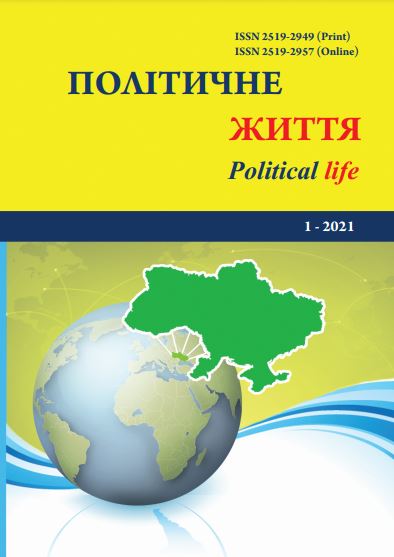Political Transformation of Georgia During Post-bipolar Period
DOI:
https://doi.org/10.31558/2519-2949.2021.1.3Keywords:
democratization; Georgia; political transformation; democracy; political regimeAbstract
The article studies the process of political transformation of Georgia since the declaration of its independence. The author`s hypothesis is that Georgia's political transformation should lead to the democratization of its political regime, which in this study is seen as a process of departure from the former Soviet practices of the political system. That is, political transformation is a multidimensional process of gradual departure from socialism. The author analyses a number of factors of the political regime change, from the first democratic government of Zviad Gamsakhurdia, which began the process of political transformation of Georgia, the coming to power of Eduard Shevardnadze, and his resignation in a result of mass protests called “colour revolution”, leading to the election victory of Mikheil Saakashvili, whose political force, the United National Movement, was replaced by the Georgian Dream. Also, the study examines the features of the political regime in Georgia, examines the process of establishment and development of power relations, and identifies the main trends and links that directly influenced the process of development of the political system since 1991. The aim of the study is to identify the main reasons that hindered the process of democratization of Georgia, contributing to the understanding of the patterns of democratic development of the country's political system. The main methods used are empirical, problemchronological, and case study method. The author concludes that Georgia's political transformation can be characterized by a combination of authoritarian and democratic tendencies. The country's transformation process has not been simple and homogeneous, and the on-going process of democratization in Georgia is the result of the collapse of the Soviet system, which can now be described as an incomplete transition to a consolidated democracy. However, given Georgia's aspirations to become a member of NATO and the European Union, resolving the problem of secessionist regions on the path to building a democratic state is extremely important.
References
Особливості суспільно-політичної модернізації країн пострадянського простору: монографія / ред. А. Г. Бульвінського. Київ : Ін-т всесвіт. історії НАН України, 2017. 288 с.
Паска О. Становлення та розвиток інституту президентства у посткомуністичній Грузії. Ефективність державного управління. 2016. № 3. С. 95 – 101. URL: http://nbuv.gov.ua/UJRN/efdu_2016_3_11.
«Суспільний ідеал» і «політичний інтерес»: теоретичне осмислення і практика країн світу / кер. авт. колективу А. Кудряченко. Київ: Держ. установа «Ін-т всесвіт. історії НАН України, 2019. 77 с.
Хейл Г. Президентський режим, революція і демократія. Pro et Contra. 2008. № 1. С. 6 – 21.
Долидзе В. М. Посткоммунистическая трансформация и циклы политического развития Грузии. Постсоветские исследования. 2019. № 1. С. 885 – 892.
Кухианидзе А. Демократия и политическая трансформация в Грузии (1991–2018). Восток Европы. 2018. № 2. С. 137 – 155. URL: https://doi.org/10.17951/we.2018.4.2.137.
Прокофьев А. В. Институциональные факторы трансформации политических режимов Грузии, Киргизии и Украины (начало 2000-х годов). Политическая экспертиза: ПОЛИТЭКС. 2010. № 2. С. 116 – 132.
Hale H. Regime Cycles. Democracy, Autocracy, and Revolution in Post-Soviet Eurasia. World Politics. 2005. No. 10. P. 137 – 139.

